 Features
Features

Autism doesn’t just affect individuals. It is a condition that burdens entire families. But a common misconception that autism means a life sentence of suffering for all those involved can be dispelled after the two youngsters found their calling, in the circus.
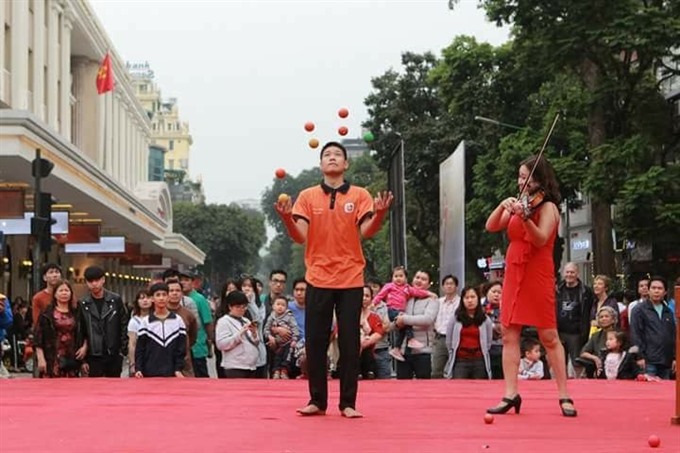 |
| What goes up comes down: Nguyễn Khôi Nguyên, 17, juggles on street. — Photos courtesy of Nguyên’s family |
HÀ NỘI — Autism doesn’t just affect individuals. It is a condition that burdens entire families. It takes over whole lives of everyone close to those individuals suffering.
That’s exactly what happened to the families of teenager Nguyễn Khôi Nguyên and seven-year-old Nguyễn Đình Khánh Hưng when doctors told the parents the news their children were on the spectrum.
But a common misconception that autism means a life sentence of suffering for all those involved can be dispelled after the two youngsters found their calling, in the circus.
Their hard work, dedication and commitment paid off after the pair were last year recognised by the Việt Nam Records organisation – Vietkings.
It may not have been maths or English the pair excelled, but in the field of circus performance, the duo is top of the pile.
When it comes to riding a unicycle while juggling, and balancing bottles on their heads, these boys are among the best in the country.
But that was just the beginning of an amazing journey. The two are now an inspiration to other sufferers and their families.
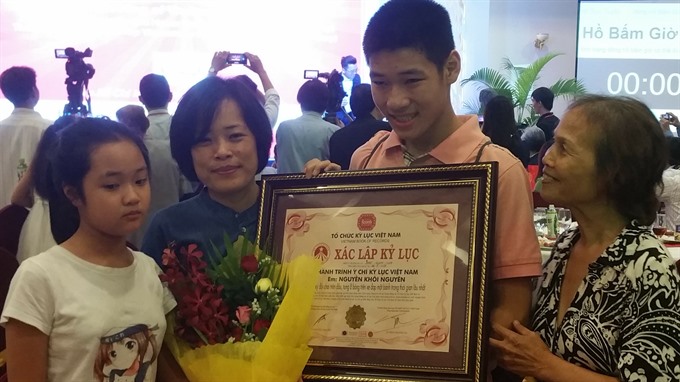 |
| Masterful: Nguyên receives a certificate award from the Việt Nam Records Organisation – Vietkings in May 2017, for his ability to hold a bottle on his head while riding a unicycle and juggling balls for a longer period of time than any other Vietnamese who has tried the feat. |
Unforgetable time
Nguyên’s father Nguyễn Thế Hiệp said when Nguyên was born, the whole family was very happy as he was the first child and the heir.
Hiệp said his son was just six months when he began realising something was not right. At three he was diagnosed as autistic.
"My family was shocked,” the father said, struggling to accept the life his son faced.
“The more we sought, the less hope we got,” he said.
At 13 years old Nguyên would struggle to concentrate. Even something as simple as sitting still was difficult, let alone tackle a maths problem.
School was another whole problem. He was disruptive in class and would fight with fellow pupils. As a result gaining a full time education and finding a school that would accept him was tough for his father.
Meanwhile Hưng at first appearance, was a cute boy, small in size but with a wide smile. But dig a little deeper and you would find a troubled youngster.
His mother Thu, from the ethnic community of Sán Dìu from the northern province of Vĩnh Phúc said for Hưng, a boy aged seven years old, even the simplest things, like feeding him rice, were a challenge.
Thu said she herself was beaten by her son when she played with him.
Thinking something was wrong with him, she tried to convince her husband to take their son to hospital.
The burden of raising such a child was too difficult for the couple. They are now separated.
Thu decided the best option for her child was to send him to the Tâm Việt Centre in Hà Nội, the same place helping Nguyên.
The centre cares for around a dozen youngsters, all with similar conditions.
Director and co-founder of the centre, Dr Phan Quốc Việt, is an expert in soft skill training. It was him who introduced the boys to circus class.
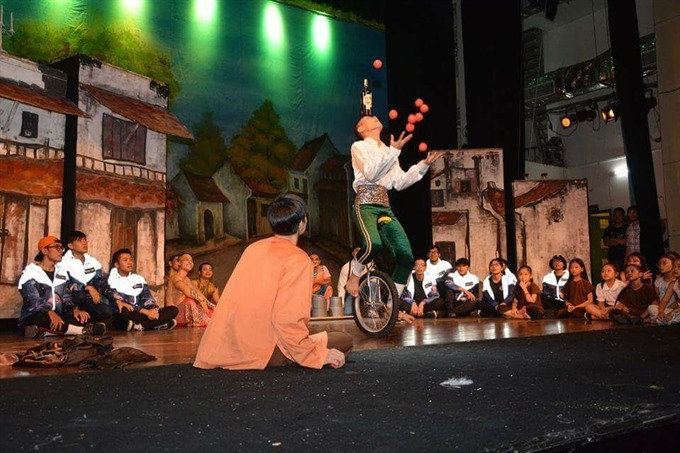 |
| Bright lights: A circus performance on stage by Nguyên. |
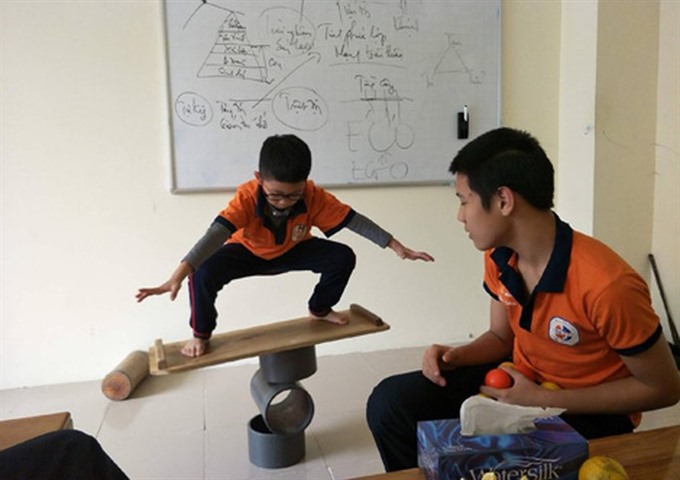 |
| Working together: Hưng (left) and Nguyên practise together in class. — Photo baomoi.com |
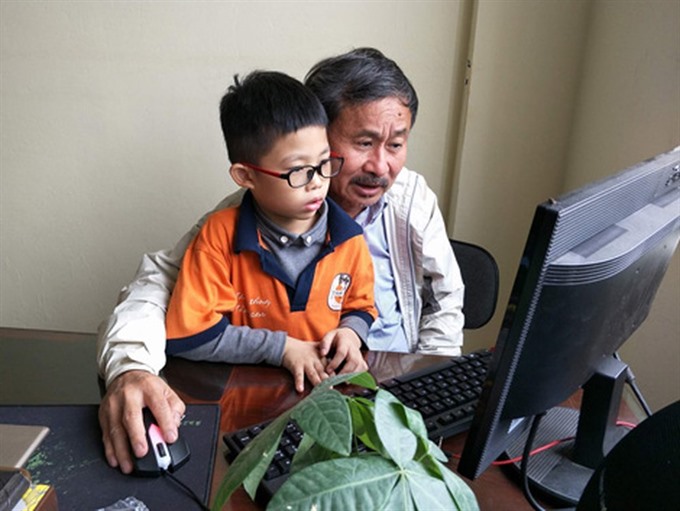 |
| Next generation: Director and co-founder of the Tâm Việt Centre (right) is tutoring Nguyễn Đình Khánh Hưng to use the computer at the Tâm Việt Centre. — Photo baomoi.com |
Miracle success
While many parents felt their children do not possess the basic skills other youngsters have, Dr Việt could see something many couldn’t.
He noticed that while the boys may not have the ability to read, write and solves problems, they did possess exception skills he could nurture and evolve.
Nguyên, Hưng and many other youngsters, with the syndrome and without proper treatment, would have hard time controlling their emotions and actions, like screaming and harming themselves and even others.
“For these children, trying to get them to calm down doesn’t work. It’s better to develop the ability they have,” Việt explained.
“The idea is to get them outdoors and let them do what they are good at and make them active physically.”
Việt founded the Tâm Việt Centre six years ago after years of researching the ineffectiveness of medicines used to treat autism and how conventional treatments were inhibiting children from blending in with society.
Incorporating circus stunts with discipline helped the pair find their calling, Việt told Việt Nam News.
He called it "the transformational coaching technology" -- a technology that combines scientific achievements from stem cell / regenerative medicine, neuroscience and behavioral science, in a loving energy ecosystem.
It is also a non-medical therapy. But one of the main success stories is using this method to have the children help each other, and also passing on his skills to their parents so they can use the practice at home.
Before meeting Dr Việt, Nguyên’s father said his son used to suffer seizures and doctors said he would have to take medication his whole life.
Hiệp and his wife went to different hospitals but were often only prescribed drugs.
“The drugs help stop the seizures, but it also makes him less interested in what is happening around him,” Hiệp said.
Refusing to let his son depend totally on drugs and struggle against the syndrome alone, Hiệp took Nguyên to as many schools as possible. However, the epileptic child was usually sent away from those schools after a short period. He was too active to attend classes.
“Now, Nguyên’s autistic symptoms have reduced by 80 per cent after four years studying at the Tâm Việt Centre. It is really a miracle achievement,” he added.
Nguyên and Hưng are now fascinated with circus stunts. They are also helping other children perform.
They have shone on big stages with his mesmerising performances amid the love and pride of family and teachers and the admiration of audiences.
“Nguyên can do a combination of several stunts, which few Vietnamese professional circus performers can,” Việt said.
After setting up a Việt Nam Record: juggling eight balls while balancing a bottle on his forehead and riding an unicycle, he wants to better himself. More balls, riding in reverse and even doing it blindfolded.
His next step is an attempt for the Guinness World Record.
Nguyên’s parents said they would do whatever they could to help their son prove himself. Hưng’s mother committed to become closer to her son to help him continue to follow his dream of performing in the circus.
Speaking to Việt Nam News via phone, Nguyên’s father appealed to all parents of kids with autism that they should never relinquish their dedication and hope in taking care of their children.
“Be confident, patient and never give up, then you will succeed,” he said.
Currently, Nguyên’s parents are running two special education centres in Hà Nội and Huế City, named the Khôi Nguyên Special Education Centre, to help others parents teach and care for their autistic children.
The two facilities provide services to about 60 children born with the same condition as Nguyên’s. Sometimes, Nguyên joined his mother to teach and play with her students at classes.
For these boys, riding a unicycle, juggling balls and balancing things on their heads has really helped them cope with their condition.
But in reality, what the circus has really done is help them juggle problems, balance emotions and ride on a much better path for a far better life. Not just for them, but for everyone who loves and cares for them. — VNS





 Brandinfo
Brandinfo